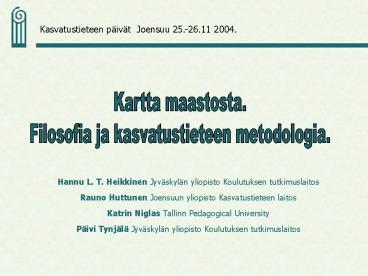Hannu L' T' Heikkinen Jyvskyln yliopisto Koulutuksen tutkimuslaitos - PowerPoint PPT Presentation
1 / 12
Title:
Hannu L' T' Heikkinen Jyvskyln yliopisto Koulutuksen tutkimuslaitos
Description:
Hannu L. T. Heikkinen Jyv skyl n yliopisto Koulutuksen tutkimuslaitos ... The ascendance of interpretivism and constructivism, followed. by the paradigm wars' ... – PowerPoint PPT presentation
Number of Views:61
Avg rating:3.0/5.0
Title: Hannu L' T' Heikkinen Jyvskyln yliopisto Koulutuksen tutkimuslaitos
1
Kasvatustieteen päivät Joensuu 25.-26.11 2004.
Kartta maastosta. Filosofia ja kasvatustieteen
metodologia.
- Hannu L. T. Heikkinen Jyväskylän yliopisto
Koulutuksen tutkimuslaitos - Rauno Huttunen Joensuun yliopisto Kasvatustieteen
laitos - Katrin Niglas Tallinn Pedagogical University
- Päivi Tynjälä Jyväskylän yliopisto Koulutuksen
tutkimuslaitos
2
Methodological naivism
quantitative
qualitative
3
Methodological naivism
4
The roots of current debates
- Early debates
- from 17th century to the first half of 20th
centuries - Prosperity of positivism and the domination of
quantitative methods in social sciences - from 1930s to 1950s
- The debunking of logical positivism after World
War II and the pervasiveness of the
postpositivist position - the end of 1950s and beginning of 1960s
- The ascendance of interpretivism and
constructivism, followed by the paradigm wars - from late 1960s onwards
5
Main distinctions seen between quantitative and
qualitative paradigms
- - The Conventional and Constructivist Belief
Systems (Adapted from Guba and Lincoln
1989)
6
Main distinctions seen between quantitative and
qualitative paradigms
- - Different levels of research as seen by
interpretivists/incompatibilists
Epistemological level
positivism
interpretivism/ constructivism
quantitative paradigm
qualitative paradigm
Methodological level
Technical level
quantitative methods
qualitative methods
Data
quantitative data
qualitative data
7
Main distinctions seen between quantitative and
qualitative paradigms
- - Common dichotomies in methodological literature
8
Different views about the relationship between
qualitative and quantitative methodologies
- - Strong paradigmatic view
- Only one of approaches is good/appropriate/scien
tific enough for the inquiry about the social
life. Quantitative and qualitative research
methodologies are tightly bound to different
mutually exclusive epistemological positions,
therefore the combination or mixing of those
approaches is not possible. - - Weak paradigmatic view
- Both approaches can be used and are useful, but
as they carry with them different philosophical
underpinnings they are suitable in very different
- situations and contexts and therefore one can
not and should not combine quantitative and
qualitative approaches in the framework of one
study. - - Opponents of paradigmatic view
- Quantitative and qualitative approaches are
both regarded as useful and proper ways of going
to study the social world. Although there are
some major differences between quantitative and
qualitative research there are also some
important similarities between them. The
integrated use of different methodologies is
welcome if it can advance our understanding about
the phenomenon under the investigation.
9
Guba Lincoln development of paradigm system
10
Quantitative and qualitative methodologies as
complementary approaches
- - Paradigmatic model does not fit the actual
(research) practice(Eckeberg and Hill 1980,
Freidheim 1979, McNamara 1979, Hammersley
1992,Niglas 1999, ) - - Qualitative and quantitative methodologies are
not polar but constitute a continuum and the
influence of different philosophical schools of
thought to research methodology is much more
diffuse as it has been depicted by the proponents
of paradigmatic view (Hammersley 1992, Bryman
1988, Howe 1988, Newman Benz 1998, Niglas 2001
2004, )
11
(No Transcript)
12
(No Transcript)
13
Literature
- Heikkinen, H. 1997. Objektiivisuuskohtauksista
relativismin suohon. Paradigmasiirtymän
tarkastelua Guban ja Lincolnin vanavedessä.
Teoksessa P. Nuutinen (Toim.) Tutkiva opettaja.
Kokemuksista pedagogiikaksi. Joensuu Joensuu
University Press. - Heikkinen, H., Kakkori. L. Huttunen, R. 2001.
This is my truth tell me yours. Educational
Action Research 9 (1), 2001. http//www.triangle.c
o.uk./ear/content/pdfs/9/issue9_1.asp1 - Heikkinen, H. 2002. Whatever is narrative
research? In R. Huttunen, H. Heikkinen L.
Syrjälä. Narrative research. Voices of teachers
and philosophers. Jyväskylä SoPhi. - Huttunen, R. 2003. Rationaalisuusteorian vaatimus
indoktrinaation määrittelyssä. Teoksessa R.
Huttunen Kommunikatiivinen opettaminen.
Indoktrinaation kriittinen teoria. Jyväskylä
SoPhi. - Huttunen, R., Heikkinen, H. Tynjälä, P. 2004.
Voiko konstruktivisti olla realisti? Esitelmä
aikuiskasvatuksen tutkijatapaamisessa 13.2.2004.
http//joyx.joensuu.fi/rhuttun/voiko.ppt - Niglas, K. 2004. The Combined Use of Qualitative
and Quantitative Methods in Educational Research.
Tallinn Pedagigical University. Dissertations on
Social Sciences. TPÜ Kirjastus, Tallinn. ISBN
9985-58-298-5. Short version http//www.ear.ee/e-
rmtk/sotsiaalt.htm - Niglas, K. 2001. Paradigms and Methodology in
Educational Research.Paper given at ECER2001
Available at Education Line http//www.leeds.ac.uk
/educol/. - Niglas, K. 2000. Combining Quantitative and
Qualitative Approaches.Paper given at ECER2000
Available at Education Line http//www.leeds.ac.uk
/educol/. - Niglas, K. 1999. Quantitative and Qualitative
Inquiry in Educational Research is there a
paradigmatic difference between them? Paper
given at ECER1999 Available at Education Line
http//www.leeds.ac.uk/educol/ - Tynjälä, P., Heikkinen, H. Huttunen, R. 2004.
Konstruktivistinen oppimiskäsitys ohjaamisen
perustana. Käsikirjoitus Aikuiskasvatuksen
vuosikirjaan 2004. Toim. A. Malinen P. Sallila
(Painossa.)































